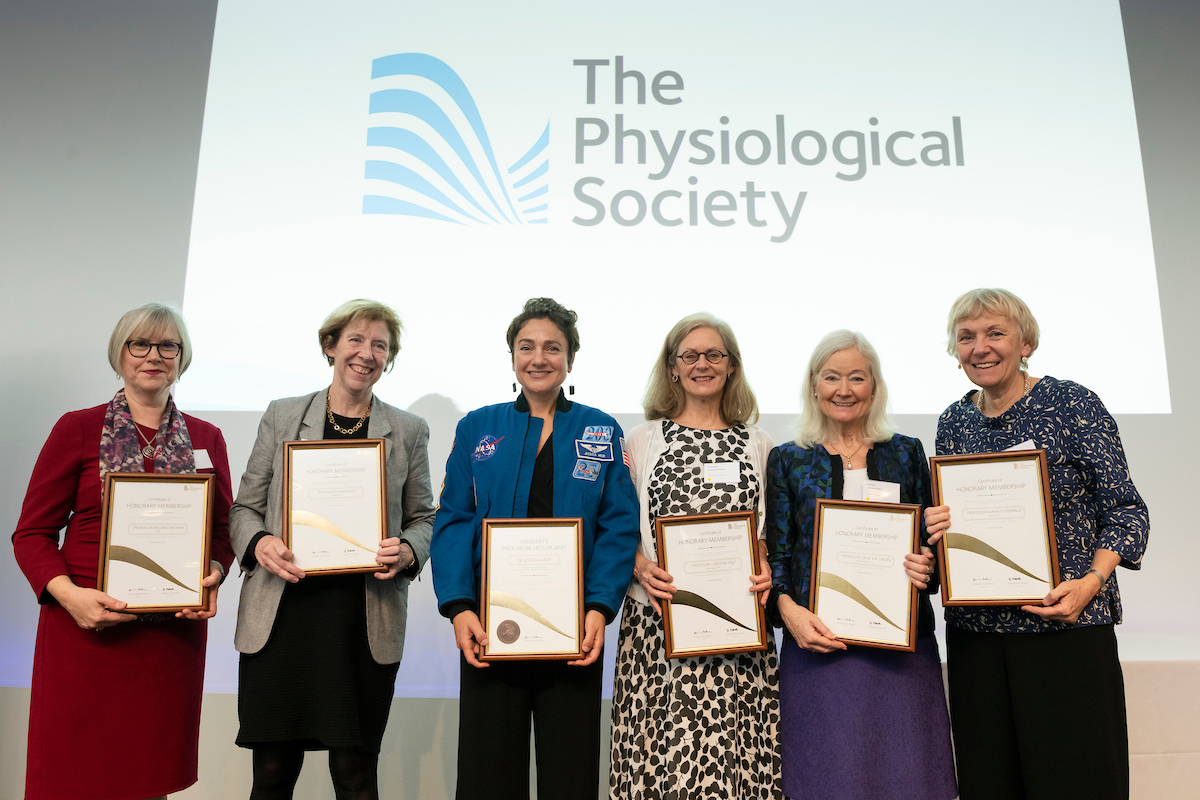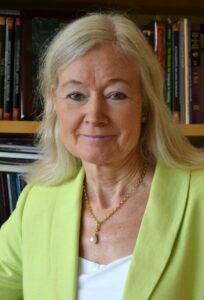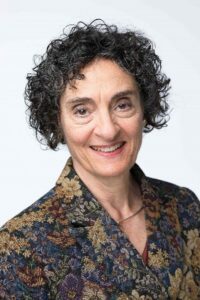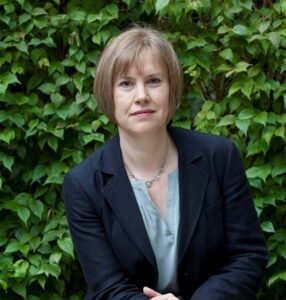
The Physiological Society was delighted to formally welcome our new 2021 Honorary Members at our Awards Ceremony and President’s Lecture on 19 November at the Royal Society in London. The new Honorary Members received their certificates alongside NASA astronaut and physiology Dr Jessica Meir, who delivered of 2021 President’s Lecture.
Pictured in the photo above (from left to right):
- Professor Melanie Welham FRSB, Biotechnology and Biological Sciences Research Council (BBSRC)
- Professor Fiona Watt FRS FMedSci, King’s College London, UK
- Dr Jessica Meir, NASA Astronaut and Physiologist – recipient of 2021 President’s Lecture Medal
- Professor Christine Holt FRSB FMedSci FRS, University of Cambridge, UK
- Professor Dame Kay Davies CBE DBE FMedSci FRS, University of Oxford, UK
- Professor Maria Fitzgerald FMedSci FRS, University College London, UK
Two of our 2021 Honorary Members were unable to attend our Ceremony:
- Professor Carla J. Shatz Ph.D. ForMemRS, Stanford University, California, US
- Rt Hon. Lord David Willetts FRS, Resolution Foundation
Honorary Membership is the highest honour that The Physiological Society presents to an individual and it recognises persons of distinction in science who have contributed to the advancement of physiology.
President Professor David Paterson says: “These individuals, through their significant contributions have enriched our discipline and increased the recognition of the important role of physiology and its relevance to today’s world.”
Read about all our all Honorary Members here.
Our 2021 Honorary Members

Professor Dame Kay Davies CBE DBE FMedSci FRS, University of Oxford, UK
Professor Dame Kay Davies, PhD, DBE FMedSci FRS is the Professor of Genetics and co-Director of the MDUK Oxford Neuromuscular Centre in the Department of Physiology, Anatomy and Genetics at the University of Oxford, UK. She received a BA degree in Chemistry and a graduate PhD degree in Biochemistry from the University of Oxford. She was appointed Professor of Genetics in 1996 and then appointed Dr Lee’s Professor of Anatomy at the University of Oxford in 1998. She established and was Director of the MRC Functional Genomics Unit 1999-2017 and co-founded the Oxford Centre of Gene Function in 2000, a new institute going from genetic association in human disease to function in the whole organism. Her research interests lie in the molecular analysis and development of treatments for human genetic diseases, particularly Duchenne muscular dystrophy (DMD), and the application of genomics for the analysis of neurological disorders. She has published more than 400 papers, won numerous awards for her work and co-founded companies to translate her work to the clinic. Professor Dame Davies is a founding Fellow of the Academy of Medical Sciences and a Fellow of the Royal Society. She was appointed Governor of the Wellcome Trust in 2008 and became Deputy Chair 2013-17. She chairs the Genome England Clinical Interpretation Partnership in the UK and is a member of the GRL Board at the Sanger Institute. She was made Dame Commander of the British Empire for services to science in 2008.

Credit: BigTImages/AMS
Professor Maria Fitzgerald FMedSci FRS, University College London, UK
Professor Maria Fitzgerald studies the developmental physiology and neurobiology of pain circuits in the brain and spinal cord. Her work has had a major impact on our understanding of how pain perception emerges in childhood and how early pain experience can shape pain sensitivity for life. Professor Fitzgerald studied Physiological Sciences at Oxford University and trained in pain physiology and neuroscience with Patrick Wall FRS at University College London, UK (UCL) who taught her to love science and to never be afraid of asking questions. She was elected a Fellow of the Academy of Medical Sciences in 2000, a Fellow of the Royal Society of Anaesthetists (Faculty of Pain Medicine) in 2013, and Fellow of the Royal Society in 2016. She was awarded Honorary Membership of British Pain Society and of the International Association for the Study of Pain (IASP) in 2018 and the Feldberg Prize 2021. Her research has shown that while basic nociception is functional at birth, the systems in the spinal cord and brain that determine pain perception, central pain control, develop later in childhood and are vulnerable to stress and trauma in early life. She has changed clinical perception by showing that pain in children requires appropriate measurement and treatment which should be tailored to the developmental stage of the child. Professor Fitzgerald is currently Professor of Developmental Neurobiology at UCL.
A podcast of an interview with Professor Maria Fitzgerald where she talks about her early career “Being Brave and Asking Questions” can be found here.

Professor Christine Holt FRSB FMedSci FRS, University of Cambridge, UK
Professor Christine Holt received a BSc Honourss degree in Biological Sciences from the University of Sussex in 1977 and was awarded a PhD degree in Zoology from King’s College, London University in 1982. She did her postdoctoral training in the Physiology Department at Oxford University where she was also a Junior Research Fellow at Worcester College, and in the Biology Department at the University of California San Diego (UCSD). In 1992, she joined the faculty at UCSD and became a tenured Associate Professor in 1996. In 1997, she moved to the University of Cambridge as a Lecturer in the Anatomy Department and a Fellow of Gonville and Caius College. In 2003 she became the Professor of Developmental Neuroscience in the Department of Physiology, Development and Neuroscience. She was a Pew Scholar and a McKnight Scholar in her early career and has been the recipient of numerous grant awards from the NIH, MRC, HFSP and Wellcome Trust and ERC Advanced Grant. She serves on several Scientific Advisory Boards, Editorial Boards and Selection Committees. She was awarded the Remedios Caro Almela Prize for Research in Developmental Neurobiology (2011), the Champalimaud Vision Award (2016), Mabel Fitzgerald Prize Medal (2016) and the Royal Society Ferrier Medal (2017). She was elected Member of EMBO (2006), Fellow of the Medical Academy of Sciences (2007), Fellow of The Royal Society (2009), Fellow of the Royal Society of Biology (2011) and International Member of the National Academy of Sciences, US (2020).

Professor Carla J. Shatz Ph.D. ForMemRS, Stanford University, California, U.S.
Professor Shatz’s research aims to understand how early developing brain circuits are transformed into adult connections during critical periods of development. Her work, which focuses on the development of the mammalian visual system, has relevance not only for treating developmental disorders such as autism, but also for forging new approaches to Alzheimer’s disease by understanding how nervous and immune systems interact. Professor Shatz graduated from Radcliffe College in 1969 with a BA in Chemistry. She was honoured with a Marshall Scholarship to study at University College London, where she received an MPhil in Physiology in 1971. In 1976, she was the first woman to receive a PhD in Neurobiology from Harvard Medical School, where she studied with Nobel Laureates David Hubel and Torsten Wiesel. During this period, she was appointed as a Harvard Junior Fellow. From 1976 to 1978 she obtained postdoctoral training with Dr Pasko Rakic in the Department of Neuroscience, Harvard Medical School. In 1978, Professor Shatz moved to Stanford University, where she attained the rank of Professor of Neurobiology in 1989. In 1992, she moved her laboratory to the University of California, Berkeley as Professor of Neurobiology and an Investigator of the Howard Hughes Medical Institute. From 2000 – 2007 she was Chair of the Department of Neurobiology at Harvard Medical School and the Nathan Marsh Pusey Professor of Neurobiology. In recognition of her contributions, in 1992, she was elected to the American Academy of Arts and Sciences, in 1995 to the National Academy of Sciences, in 1997 to the American Philosophical Society, in 1999 to the Institute of Medicine, and in 2011 she was elected a Foreign Member of the Royal Society of London. Among her many awards, Professor Shatz received the Gerard Prize in Neuroscience in 2011 from the 40,000 member Society for Neuroscience, and in 2015, the Gruber Prize in Neuroscience. In 2016, she was the recipient of the Champalimaud Vision Prize, and the Kavli Prize in Neuroscience for the discovery of mechanisms that allow experience and neural activity to remodel brain circuits. In 2018 she received the international Harvey Prize in Science and Technology from the Technion Israel Institute of Technology.
Professor Carla Shatz said of her appointment, “For me, the word physiology is synonymous with life systems and there is no other equivalent word. I am really glad to be recognized in this special way.”

Professor Fiona Watt FRS FMedSci, King’s College London, UK
Fiona Watt obtained her first degree from Cambridge University, UK and her DPhil, in cell biology, from the University of Oxford, UK. She was a postdoc at Massachusetts Institute of Technology (MIT), where she first began studying differentiation and tissue organisation in mammalian epidermis. She established her first research group at the Kennedy Institute for Rheumatology and then spent 20 years at the CRUK London Research Institute (now part of the Francis Crick Institute). She helped to establish the CRUK Cambridge Research Institute and the Wellcome Trust Centre for Stem Cell Research and in 2012 she moved to King’s College London to found the Centre for Stem Cells and Regenerative Medicine. In 2018 she became Executive Chair of the Medical Research Council. Professor Watt is a Fellow of the Royal Society, a Fellow of the Academy of Medical Sciences and an Honorary Foreign Member of the American Academy of Arts and Sciences. Her awards include the American Society for Cell Biology (ASCB) Women in Cell Biology Senior Award, the Hunterian Society Medal and the FEBS/EMBO Women in Science Award. In 2016 she was awarded Doctor Honoris Causa of the Universidad Autonoma de Madrid. She is internationally recognised for her work on stem cells and their interactions with the niche in healthy and diseased skin.

Professor Melanie Welham FRSB, Biotechnology and Biological Sciences Research Council (BBSRC)
Professor Melanie Welham started her scientific career as an undergraduate in Biochemistry at Imperial College, London, the first member of her family to attend University. She then moved to the Imperial Cancer Research Fund, London, for her PhD, which focused on cancer cell biology. After several years of postdoctoral research, studying cytokine biology and the haematopoietic system at The Biomedical Research Centre, University of British Columbia, in Vancouver, Canada, Professor Welham was appointed to a Lectureship in the Department of Pharmacy and Pharmacology, University of Bath, UK where she developed a career as a leading researcher in molecular signalling and stem cell science. She was the first female Professor appointed in the 97-year history of her department and served as Co-Director of the University’s Centre for Regenerative Medicine for 4-years.
In 2012 Professor Welham was appointed as Executive Director of Science at the Biotechnology and Biological Sciences Research Council (BBSRC), the largest public funder of non-medical biological research in the UK. From 1 April 2018, Professor Welham has been Executive Chair of BBSRC, now part of UK Research and Innovation. BBSRC invests around £450M annually in research in Universities and Institutes that is seeking to increase our understanding of fundamental biological processes and systems, develop new technologies and find solutions to some of the key challenges facing society, such as healthy ageing, tackling infections, and harnessing the power of biology to produce food, fuel, fibre, chemicals and medicines sustainably. Professor Welham has served on and chaired many panels and boards, including national and international review committees and advisory groups. She is currently a Member of the Board of Trustees of the Human Frontiers Science Program Organisation, a Member of the Governing Board for Science Europe and a member of the Global BioData Coalition Board. In her current role Professor Welham is an advocate for equality, diversity and inclusion and proud mother of two independently-minded daughters.

Rt Hon. Lord David Willetts FRS, Resolution Foundation
The Rt Hon. Lord Willetts FRS is the President of the Resolution Foundation. He served as the Member of Parliament for Havant (1992-2015), as Minister for Universities and Science (2010-2014) and previously worked at Her Majesty’s Treasury and the No. 10 Policy Unit. As Science Minister he officially opened Hodgkin Huxley House back in 2013.
Lord Willetts is a Visiting Professor at King’s College London, and a Board member of UK Research and Innovation (UKRI). He is Chair of The Foundation for Science and Technology. He is an Honorary Fellow of Nuffield College, an Honorary Fellow of the Royal Society and the Chancellor of the University of Leicester. Lord Willetts has written widely on economic and social policy. His book A University Education is published by Oxford University Press. A second edition of his book on the Boomers and the young generation The Pinch was published in November 2019.
The Rt Hon. Lord David Willetts said, “I am of course delighted and honoured to have been elected an Honorary Member of The Physiological Society. It seemed very fitting that your letter came from Hodgkin Huxley House which I have happy memories of opening back in 2013.”
